绿茶多酚对神经退行性疾病的保护作用:证据和可能的机制。
IF 3.7
3区 医学
Q2 NUTRITION & DIETETICS
引用次数: 0
摘要
衰老是神经退行性疾病的主要危险因素。随着全球人口的老龄化,阿尔茨海默病(AD)和帕金森病(PD)等神经退行性疾病的患病率在全球范围内增加。不幸的是,这些神经退行性疾病的可用治疗选择是有限的,其中大多数只能提供症状缓解,并有潜在的严重副作用。流行病学研究表明,饮用绿茶可以降低认知能力下降的患病率,降低患AD和PD的风险,这是一种有吸引力的预防和治疗选择。多酚是绿茶中的主要生物活性成分,有助于绿茶的有益作用。越来越多的数据表明,绿茶多酚(GTPs)具有抑制神经退行性疾病病理发展的神经保护特性;然而,其潜在的机制尚未完全被理解。本文综述了gtp在体外和体内对神经退行性疾病(主要是AD和PD)的神经保护作用的证据,并总结了gtp可能阻碍神经退行性疾病进展的分子机制。这篇综述特别强调了gtp在神经退行性疾病发病机制中的调节作用,包括氧化应激介导的神经元毒性、蛋白质平衡受损和金属离子平衡失调。本文还讨论了利用gtp干预神经退行性疾病的潜力,希望为这些疾病的新的预防和治疗策略提供有用的见解。本文章由计算机程序翻译,如有差异,请以英文原文为准。
Protection of Green Tea Polyphenols against Neurodegenerative Diseases: Evidence and Possible Mechanisms
Aging is a major risk factor for neurodegenerative diseases. With aging of the global population, the prevalence of neurodegenerative diseases, such as Alzheimer's disease (AD) and Parkinson's disease (PD), has increased worldwide. Unfortunately, the available therapeutic options for these neurodegenerative diseases are limited, most of which only provide symptomatic relief and have potentially serious side effects. Epidemiological studies have shown that green tea consumption is associated with a lower prevalence of cognitive decline and decreased risk of AD and PD, providing an attractive preventive and therapeutic option. Polyphenols are major bioactive components in green tea, which contribute to the beneficial effects of green tea. Accumulating data suggest that green tea polyphenols (GTPs) have neuroprotective properties that inhibit the pathological development of neurodegenerative diseases; however, the underlying mechanisms are not yet completely understood. This paper reviews both in vitro and in vivo evidence that demonstrates the neuroprotective effects of GTPs against neurodegenerative diseases, with the main focus on AD and PD, and summarizes the possible molecular mechanisms by which GTPs impede the progression of neurodegeneration. In particular, this review highlights the modulation of GTPs on the common mechanisms involved in pathogenesis of neurodegenerative diseases, including oxidative stress-mediated neuronal toxicity, impaired proteostasis, and metal ion dyshomeostasis. The potential of using GTPs in the intervention of neurodegenerative diseases is also discussed, hopefully, providing useful insights into novel preventive and therapeutic strategies for these diseases.
求助全文
通过发布文献求助,成功后即可免费获取论文全文。
去求助
来源期刊

Journal of Nutrition
医学-营养学
CiteScore
7.60
自引率
4.80%
发文量
260
审稿时长
39 days
期刊介绍:
The Journal of Nutrition (JN/J Nutr) publishes peer-reviewed original research papers covering all aspects of experimental nutrition in humans and other animal species; special articles such as reviews and biographies of prominent nutrition scientists; and issues, opinions, and commentaries on controversial issues in nutrition. Supplements are frequently published to provide extended discussion of topics of special interest.
 求助内容:
求助内容: 应助结果提醒方式:
应助结果提醒方式:


